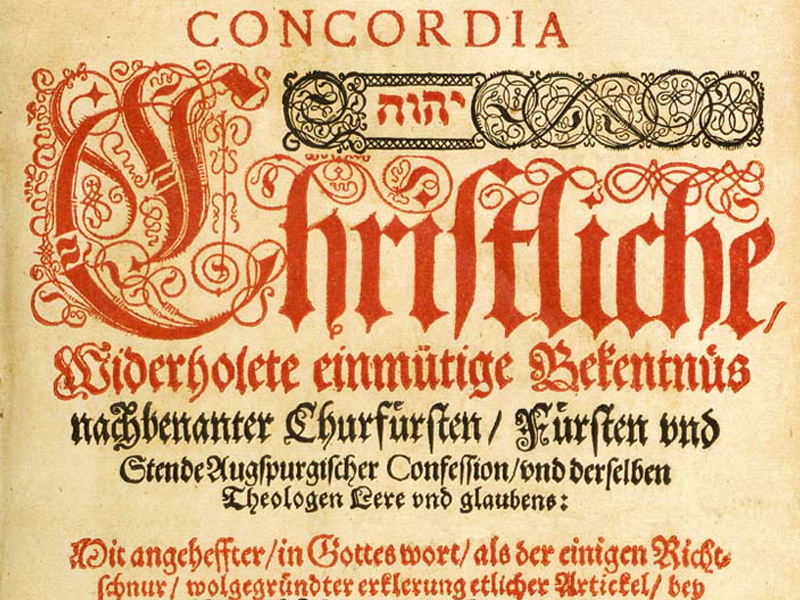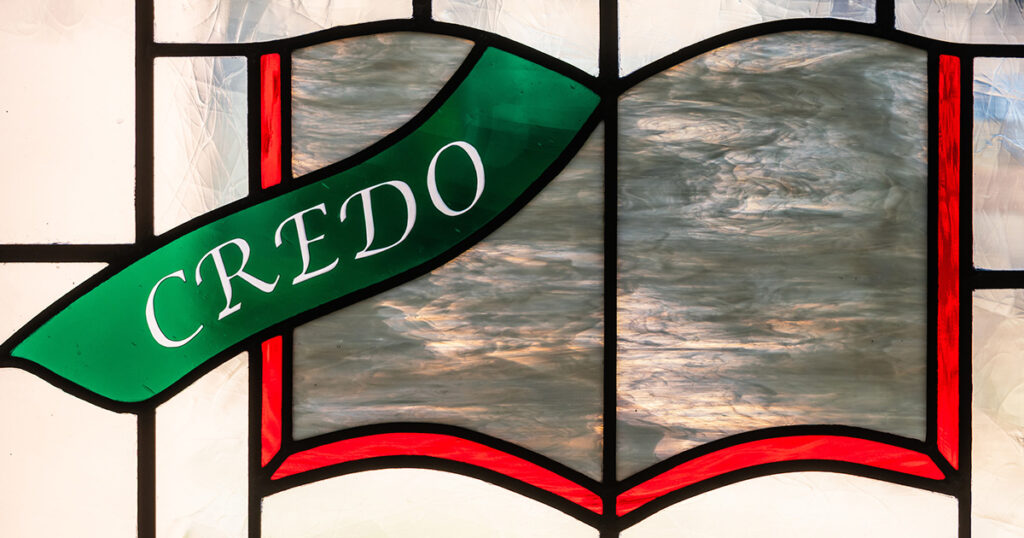by Matthew C. Harrison
The sainted former LCMS First Vice-President Rev. Dr. Herbert Mueller Jr. was on the drafting committee for the ordination rite in our Lutheran Service Book: Agenda. In the rite, the ordinand first confesses that he regards the prophetic and apostolic Scriptures to be the inspired Word of God. After the reading of the list of the three ecumenical creeds and then again after the recitation of the documents of our Book of Concord, the ordinand says, “I make these creeds [and confessions] my own because they are in accord with the Word of God.”
Herb added the “because.” It wasn’t in the previous rite. In fact, our confessional pledge was pretty much the same as the Evangelical Lutheran Church in America’s pledge (though we certainly understood this pledge differently). Liberal Lutheranism and historic Lutheran pietism (“faith in the heart is what matters, not words on a page”) have long accepted our Book of Concord “insofar as” it agrees with the Word of God. That means the individual and his or her interpretation of the Bible is king. If he wants to chuck part of the Lutheran Confessions based on his own personal understanding of the Bible, he feels free to do so. That’s how liberal world Lutheranism has managed to declare church fellowship with churches that deny the body and blood of Christ in the Lord’s Supper, the pastor’s absolution, and the divine authority of the written Word of God.
This is important. We all learned and still learn the Small Catechism. We know that each chief part just sets forth the clear simple truth of the Bible by directly quoting clear statements of the infallible Word of God. If my pastor has not sworn to uphold the divine authority of the Bible and teach it according to the clear confession of the Book of Concord, how do I know he’ll preach the truth of the Gospel to me? How do I know he’ll comfort me with the Gospel, after correcting me and calling me to account through the Law? How do I know that he’ll make sure I’m baptized and constantly remind me of that fact when I’m doubting or hurting or suffering? How do I know that he will preach the deeds, life, death and resurrection of Christ as truth for the forgiveness of my sins — forgiving me right now when I need it most? I don’t. It’s a roll of the dice. How do I know my children and grandchildren will be taught the strong Gospel and continue to hear it clearly? If you belong to an LCMS church (or one of the other confessionally Lutheran churches in the U.S.), make sure you hold that pastor and church to these confessional commitments.
The word “conscience” appears on every other page of the Book of Concord, and there are hundreds of references to “consolation,” “consoling,” “comforting” and more. But isn’t the Book of Concord all about doctrine? Indeed! But here’s the point: Sound, pure, biblical doctrine is always aimed at the repentance and forgiveness and strengthening of poor sinners like you and me. God prescribes strong biblical truth for poor, miserable, weak sinners. And He is “superabundantly generous in His grace” through the “spoken Word, by which the forgiveness of sins is preached in the whole world,” “through Baptism,” “through the holy Sacrament of the Altar,” “through the Power of the Keys,” and “through the mutual conversation and consolation of the brethren … (Matthew 18:20)” (SA III IV).
Give me Book of Concord Lutheranism! Book of Concord Lutheranism does not need to be supplemented. It cannot be supplemented with modernism or post-modernism without subtraction. It doesn’t need Anglicanism (apostolic succession, broad church latitude in doctrine, ambiguity in its public confession of Christ in the Sacrament). It doesn’t need Roman Catholicism (a pope, episcopal order, dogma of tradition, seven sacraments, obscure liturgical intricacies or splendorous vestments). It doesn’t need to be supplemented by pop evangelical, what’s-happening-now, wandering, skinny-jeaned, unvested preachers. It doesn’t need Eastern Orthodoxy (dogma of the authority of the church fathers and seven ecumenical councils, much less infant or toddler Communion).
Are there things that we can learn from all the above? Sure. But not to supplant what our Confessions make clear or to add what’s allegedly missing. The liturgy and worship taught and done well point to Jesus, not the pastor. Ceremonies are free, but when our Confessions speak of such things, they always mention fasting, pilgrimages, feast days, Sundays, shaved heads and head coverings, even as St. Paul says, “Let no one pass judgment on you in questions of food and drink, or with regard to a festival or a new moon or a Sabbath” (Col. 2:16; see also Ap VII 32–46). While the church’s worship is free and flexible, the Confessions carefully state that we avoid “useless, foolish displays” (FC SD X 7).
Lutherans have a positive view of liturgy and ceremony. We have a positive, affirming relationship with the church of all times and its best biblical practices. The church did not begin with Martin Luther. The Confessions state that Lord’s Supper “is more devoutly celebrated … among us” (AC XXIV 9). “And the usual public ceremonies are observed, the series of lessons, of prayers, vestments, and other such things” (Ap XXIV 1). Lutherans keep the order of the communion service. We use hymns ancient and new, but all must point to Christ. The church from its beginnings adopted these things because they aided in teaching and preaching Christ. As a great Lutheran pastor once put it, “The church is still the church whether it’s adorned with a glorious liturgy or appears as a pauper” — that is, with a simple liturgy and the Word of God and Sacraments and no pizzaz.
“The body of the Lord is not usually given to those who have not been examined and absolved” (AC XXV 1) or those who “do not know what they seek or why they come” (LC V 2). The marks of the church — pure Word, rightly administered Sacraments — are enough for “the true unity of the Church” (AC VII 2). There are lines of church fellowship in the rejections and condemnations of the Book of Concord. See the Preface to the Book of Concord on why condemnations cannot be avoided. At the same time, the Confessions clearly affirm that the church extends beyond the boundaries of confessional Lutheranism, and we do not condemn simple Christians (“whole churches,” says the preface) who simply believe Jesus is their Savior. “Whoever believes and is baptized will be saved” (Mark 16:16).
The Gospel rules all this. All of it serves the Gospel of free forgiveness in Jesus. All things must point to Christ, emphasize Christ, deliver Christ, serve Christ. In turn, as Christ serves us, we serve our neighbor in love using all things for the benefit of the neighbor, believer or not. And above all, solid, biblical Book of Concord doctrine serves sinners in need of Jesus.
Give me Book of Concord Lutheranism.
–Pastor Matt Harrison

Cover image: LCMS Communications/Erik M. Lunsford





